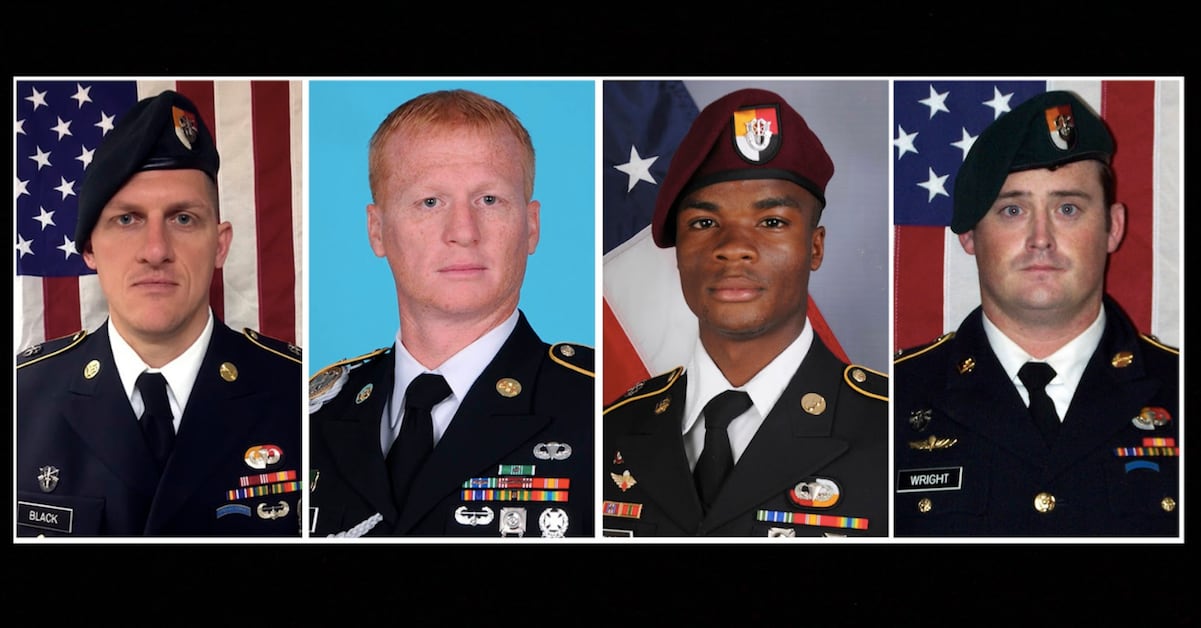The U.S. Army hasn’t learned its lesson from the 2017 Niger ambush that resulted in the deaths of four U.S. soldiers, according to the commander of the company involved in the ambush.
Alan Van Saun, the company commander for Alpha Company in the 2nd Battalion of the 3rd Special Forces Group at the time of the ambush, detailed how his trust in the Army deteriorated because of the incident in an op-ed penned for the New York Times “At War” section, marking the two-year anniversary of the attack.
On Oct. 4 2017, Van Saun was on paternity leave in North Carolina just two days after the birth of his daughter. He instantly feared the worst as he received word he needed to come to work.
“I worried about the worst-case scenario; the death of one of my soldiers,” Van Saun, who attended the U.S. Military Academy at West Point, wrote. “But even my worst imaginings could not compare to the truth I would soon learn, standing inside the Third Special Forces Group commander’s office an hour later.”
The ambush involved an 11-member Army special operations unit known as Team Ouallam and a 30-member Nigerien partner force who were conducted a mission pursuing a local ISIS commander known as Doundoun Cheffou. The mission marked the team’s third mission since they arrived in Niger roughly a month before.
The U.S. and Nigerien forces were set to infiltrate Cheffou’s camp with the assistance of a helicopter-borne team of U.S. special operations and Nigerien counterterrorism forces.
However, the helicopter team didn’t proceed with the mission due to weather issues. Even so, Team Ouallam was instructed to follow through with mission and was ambushed in Togo Togo near the Mali border by Islamic extremists.
Four U.S. soldiers - Sgt. First Class Jeremiah Johnson, Staff Sgt. Bryan Black, Staff Sgt. Dustin Wright and Sgt. La David Johnson - were killed along with five Nigerien partner force soldiers.
“Never before had I felt so hopeless,” Van Saun wrote.
Although Van Saun said he provided insight on the situation alongside intelligence analysts, he ultimately put his faith in the Army and its policies and procedures to get to the bottom of what had happened.
After a 14-month investigation into the matter, Saun was formally reprimanded for failing to adequately train his soldiers for the deployment. But Saun said such an assessment was connected to a training event that happened before he assumed command of the Alpha Company.
“Following a complicated tragedy with no clear proximate cause, First Special Forces Command issued reprimands with inaccuracies and inconsistencies, focusing on predeployment training and personnel issues, instead of operational decision made leading up to the ambush,” Van Suan wrote.
He wasn’t the only one who was reprimanded following the investigation. The commanding officer of Special Operations forces in Africa Maj. Gen. Marcus Hicks also was reprimanded for a lack of oversight on his subordinate officers, along with several other officers.
Capt. Michael Perozeni, the junior officer who led the mission, initially was reprimanded but successfully appealed his punishment, the New York Times reported in June.
Then-Acting Secretary of Defense Pat Shanahan announced in March another investigation would examine the issue in order to “ensure from top to bottom there’s the appropriate accountability.” But Shanahan determined in June that no additional punishments should be recommended on top of those already issued by AFRICOM and Special Operations Command.
“...while subsequent reviews of the investigation offered yet another chance to hold people responsible, those opportunities fled quickly, leaving the chain of command, in which I had entrusted so much, unaccountable for decisions they made in my absence, but for which I was left responsible,” Van Saun wrote.
Although Van Saun said that he had trusted the Army throughout his 15-year career and through multiple deployments, the months after the ambush eroded is trust in the Army. Ultimately, he felt he had no other decision but to leave the Army, he said.
“I am proud of my service, but even more so I am disappointed in what it cost and especially in some of the leaders I had aspired to emulate,” Van Saun wrote.
“Today, exactly two years after we lost Sgt. First Class Jeremiah Johnson, Staff Sgt. Bryan Black, Staff Sgt. Dustin Wright and Sgt. La David Johnson, I have no reason to believe any lessons have been learned to prevent more soldiers from being killed under the same circumstances,” Van Saun said.





